How Does Digestive Conditions Like Crohn’s Disease Affect the Functioning of Your Intestines
Many digestive conditions affect the functioning of the intestines. These conditions include Crohn’s disease, irritable bowel syndrome, celiac disease, peptic ulcers, and other small intestine disorders. The food that you consume influences these conditions and the body’s immune system. Examining your situation will help you identify the foods that can cause digestive diseases.
Symptoms of Crohn’s disease can range from mild stomach pain to severe diarrhea. People with the condition can also experience weight loss and skin disorders. Although there are no known causes of Crohn’s documented, many researchers believe that a faulty immune system response triggers Crohn’s. Other possible causes of the condition include genetics, a poor diet, and an overdose of corticosteroids. Consult a physician to determine if you or a family member has Crohn’s disease.
Episcleritis is the Most Common Complication of Crohn’s Disease
Your doctor will likely prescribe you medicines to relieve your symptoms. These types of drugs are harmful long-term. Sometimes, however, they will recommend undergoing surgery. If you’re going in for a visit, you should write down the reasons for your visit. If possible, bring a friend or family member with you. In addition, you should have a list of questions prepared before you visit the doctor. If you have recently been diagnosed with Crohn’s disease, be sure to write down the new diagnosis and the treatment. Make sure to ask about the possible side effects of any medication and whether there are any alternatives to it.
The most common complication of Crohn’s disease is episcleritis. Episcleritis is an inflammation of the area below the conjunctiva and can affect either one eye or both. It can cause intense itching, burning, and redness. In severe cases, the patient may develop a fistula, an opening between the intestine and another organ. Fistulas can occur between the intestine and skin or the uvea. They can lead to blurred vision, light sensitivity, and other problems when they occur.
Crohn’s Disease Sufferers Should Limit Their Intake of Processed and Fatty Foods
If your Crohn’s disease is active, you should avoid drinking green tea. Green tea has many health benefits, but research is needed to prove its effectiveness. It can help prevent colon inflammation and reduce the risk of colon cancer. As for dietary supplements, green tea is an excellent alternative to medications. Taking green or black pepper supplements is another effective option.
If you’re experiencing severe Crohn’s symptoms, you may be suffering from an overeating disorder. Base your Crohn’s diet on the best possible nutrition. A balanced diet will not only help you regain control over your condition, but it will also help you maintain a healthy weight. While a balanced diet is essential for anyone with any digestive disorder, tailor your Crohn’s diet to your specific needs.
Antibiotics are the best option for treating the symptoms of Crohn’s disease. If you cannot tolerate certain types of medications, you can try herbal supplements. These supplements are usually safe to use, but you should consult a doctor before taking any. They can help control the symptoms of Crohn’s disease. Some of these can be very effective, depending on the type of herb you’re using.
Developing Healthy Habits Alleviates Digestive Conditions
Developing healthy habits alleviates digestive conditions. There are many helpful recommendations out there to avoid these conditions. When consuming many processed foods, you are putting yourself at risk for severe conditions such as ulcers and constipation. Processed foods are not always labeled accurately; reading the ingredients will help make better food choices.
Food research is vital to get the right nutrients necessary for proper digestion and absorption. Be mindful and eat lots of fruits and vegetables daily that contain different nutrients; this helps the digestive system function properly. It is best to avoid eating food with a high unhealthy fat content. Sometimes this is the root of these conditions. Your body may not do well with many bad fats so that it won’t process nutrients properly.
Is Obesity Another Cause of Your Unhealthy Digestive System?
Obesity is another cause of an unhealthy digestive system. Your body will not function at its best if you are obese. Obesity can increase the risk of cancer, heart attack, and high blood pressure. Therefore, it would be best to have a well-balanced diet with plenty of fiber and water. If you take care of your digestive system by exercising, walking, moving your body, you can control digestive conditions and lead a long healthy life.













